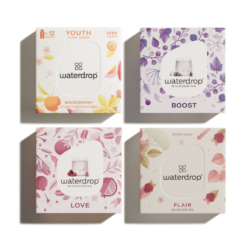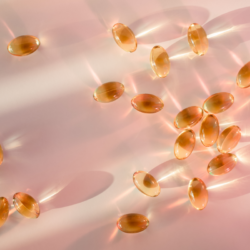The exposome is an emerging concept in environmental health that encompasses all the environmental exposures to which an individual is exposed throughout his or her life. These exposures, whether chemical, physical or biological, have a significant impact on human health and can contribute to the development of chronic diseases. One of the key mechanisms by which the exposome affects the body is oxidative stress, resulting from an imbalance between the production of free radicals and the body’s antioxidant defences.
In this context, natural antioxidant food supplements are attracting growing interest as a potential strategy for mitigating the harmful effects of the exposome.
What is the exposome?
The concept of the exposome, introduced by biologist Christopher Wild in 2005, represents all the environmental exposures to which an individual is subjected from conception to death. Its aim is to complement genetic studies by incorporating the external factors that influence human health.
Unlike an approach focused solely on the genome, the exposome includes a variety of factors: physical agents (such as UV radiation), chemical substances (such as atmospheric pollutants), biological agents (viruses, bacteria), as well as individual behaviour, the socio-economic environment and psychological state. These exposures can interact with each other and with our genetic make-up, contributing to the development of multifactorial diseases such as diabetes, asthma and obesity.
The study of the exposome makes it possible to analyse the cumulative effects of multiple exposures, including cocktail effects, where the combination of different substances can have a greater impact than each substance taken in isolation. This comprehensive approach provides a better understanding of the complex links between the environment and health, helping to identify new risk factors and guide public health policies.
Exposome and oxidative stress: what is the link?
The various environmental exposures included in the exposome can have a profound influence on the body’s biological processes, particularly by inducing oxidative stress. Factors such as air pollution, ultraviolet radiation, chemical contaminants and infectious agents increase the production of free radicals.
Free radicals are unstable molecules capable of damaging cells and tissues, leading to oxidative stress when there is an imbalance between their production and the body’s ability to neutralise them via antioxidants. This oxidative stress is implicated in premature ageing and the development of numerous chronic diseases, including cardiovascular disease, certain cancers and neurodegenerative disorders.
By understanding the link between the exposome and oxidative stress, it is possible to develop prevention and health protection strategies. This includes reducing harmful exposures and boosting the body’s antioxidant defences, for example via natural antioxidant food supplements. This integrated approach is essential to reduce the harmful effects of environmental exposure on our health.
What are natural antioxidants?
A natural antioxidant is a substance capable of neutralising free radicals, thereby reducing oxidative stress and its harmful effects on the body. Natural antioxidants can be vitamins, minerals or phytochemical compounds found in plants.
Food supplements offer a concentrated source of natural antioxidants. The main antioxidant supplements include :
| Category | Antioxidant | Actions and properties |
|---|---|---|
| Vitamins | Vitamin C | Powerful antioxidant action, regenerates other antioxidants. |
| Vitamin E | Protects cell membranes against lipid oxidation. | |
| Minerals | Selenium | Essential co-factor for antioxidant enzymes. |
| Zinc | Participates in the structure of several antioxidant enzymes. | |
| Phytochemicals | Resveratrol | Present in grapes, anti-inflammatory and antioxidant effects. |
| Quercetin | Flavonoid with antioxidant and anti-inflammatory properties. | |
| Curcumin | Active ingredient in turmeric, known for its antioxidant and anti-inflammatory effects. |
Recent studies have highlighted the effectiveness of natural antioxidant supplements. For example, a review published in 2021 in the journal Antioxidants highlights the protective role of resveratrol against oxidative damage induced by atmospheric pollution. Similarly, curcumin has been associated with a reduction in markers of oxidative stress in subjects exposed to chemical contaminants.
How do natural antioxidant supplements work?
Natural antioxidant supplements protect the body by acting on several levels to combat oxidative stress, a phenomenon linked to the excessive production of free radicals. Here are the main mechanisms of action:
- Neutralising free radicals: Free radicals are unstable molecules that can damage the body’s cells. These molecules lack balance and seek to react with other cellular components, resulting in damage. Antioxidants act by ‘neutralising’ these free radicals. In concrete terms, they provide them with what they lack to become stable, thus preventing them from damaging healthy cells. By acting in this way, antioxidants limit the negative effects of oxidative stress on the body.
- Strengthening antioxidant enzymes: The body has its own enzymes for neutralising free radicals, such as superoxide dismutase (SOD), catalase and glutathione peroxidase. Natural antioxidant supplements help boost the activity of these enzymes, thus improving the body’s own defences against oxidative stress.
- Regulation of cellular processes: Natural antioxidants also influence signalling pathways in cells, helping to reduce inflammation and promote repair of damaged tissue.
Finally, by combining several types of antioxidant, we can create a synergistic effect, where the different compounds reinforce each other’s action, offering more complete protection against the deleterious effects of free radicals.
Are natural antioxidants really effective?
- Resveratrol: A clinical study showed that resveratrol supplementation for 12 weeks significantly reduced markers of oxidative stress in individuals exposed to urban pollution.
- Quercetin: Clinical trials have shown that quercetin improves endothelial function and reduces inflammation in patients at high cardiovascular risk.
- Curcumin: Curcumin has shown protective effects against oxidative damage induced by heavy metals in industrial workers.
Sources
- HEAP Symposium 2024
- Antioxidant Activity of Resveratrol Diastereomeric Forms Assayed in Fluorescent-Engineered Human Keratinocytes
- Anti-Inflammatory Effects of Curcumin in the Inflammatory Diseases: Status, Limitations and Countermeasures
- Effect of Resveratrol on Markers of Oxidative Stress and Sirtuin 1 in Elderly Adults with Type 2 Diabetes
- Research progress of quercetin in cardiovascular disease
- The Differential Antagonistic Ability of Curcumin against Cytotoxicity and Genotoxicity Induced by Distinct Heavy Metals





